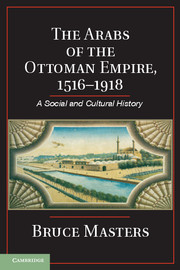Book contents
- Frontmatter
- Contents
- Acknowledgments
- Abbreviations
- Note on Transliteration
- Introduction
- 1 The Establishment and Survival of Ottoman Rule in the Arab Lands, 1516–1798
- 2 Institutions of Ottoman Rule
- 3 Economy and Society in the Early Modern Era
- 4 A World of Scholars and Saints
- 5 The Empire at War
- 6 The Tanzimat and the Time of Re-Ottomanization
- 7 The End of the Relationship
- Conclusion For the Faith and State
- Bibliography
- Index
- References
Conclusion - For the Faith and State
Published online by Cambridge University Press: 05 April 2013
- Frontmatter
- Contents
- Acknowledgments
- Abbreviations
- Note on Transliteration
- Introduction
- 1 The Establishment and Survival of Ottoman Rule in the Arab Lands, 1516–1798
- 2 Institutions of Ottoman Rule
- 3 Economy and Society in the Early Modern Era
- 4 A World of Scholars and Saints
- 5 The Empire at War
- 6 The Tanzimat and the Time of Re-Ottomanization
- 7 The End of the Relationship
- Conclusion For the Faith and State
- Bibliography
- Index
- References
Summary
They (Europeans) began their new life in the fifteenth century, while we were delayed by the Ottoman Turks until the nineteenth century. If God had preserved us from the Ottoman Conquest, we should have remained in unbroken touch with Europe and shared in her renaissance. This would have fashioned a different kind of civilization from the one in which we are now living.
Taha HusaynTaha Husayn (d. 1973), who was arguably among the most formidable intellectuals of twentieth-century Egypt, did not think much of the Ottoman legacy in his country. He was not alone in his opinion, as most Arabs of his generation judged the Ottoman centuries harshly. At the end of the empire, the Arabs had become a trope for cultural backwardness and religious obscurantism for “progressive” Ottomans. Many Arab intellectuals in the twentieth century would characterize the Ottoman Empire as having those same negative qualities. Added to the consensus that the Ottoman regime had retarded Arab intellectual, social, and political progress was the stereotype of brutish behavior by Ottoman soldiers and officials, which is often featured in literary and cinematic representations of the Ottoman past in Arabic-language media. When asked about the Ottoman centuries, many elderly Arabs will respond with a simple phrase, zulm al-turk, the “oppression of the Turks.” It is safe to say that there is little nostalgia for the ancien régime in the Arab lands, although the complete proverb from which the phrase is taken is more ambivalent: Zulm al-turk walacadil al-cArab, “The oppression of the Turks is better than the Bedouins’ justice.”
- Type
- Chapter
- Information
- The Arabs of the Ottoman Empire, 1516–1918A Social and Cultural History, pp. 225 - 232Publisher: Cambridge University PressPrint publication year: 2013
References
- 1
- Cited by



